The name Rona
Barrett may not be immediately recognizable to today’s media-savvy,
twitter-texting generation, but you must remember this: Barrett is a
true pioneer in the field of entertainment journalism.
Long before there
was Entertainment Tonight, The E! Channel or even TMZ,
there was our Miss Rona (as she was affectionately called), giving
us the 411 on everybody from Cher to Barbra Streisand to Erik
Estrada.
Her syndicated
newspaper columns, followed by her colorful fan magazines (which
bore her name, such as Rona Barrett’s Hollywood) and
eventually her appearances on network television, helped build an
industry about an industry. Thanks to Barrett, America finally saw
through the bullshit glitz of Tinseltown. At last it was understood
as a hard-driving business that wasn’t so much about common sense as
it was about dollars and cents.
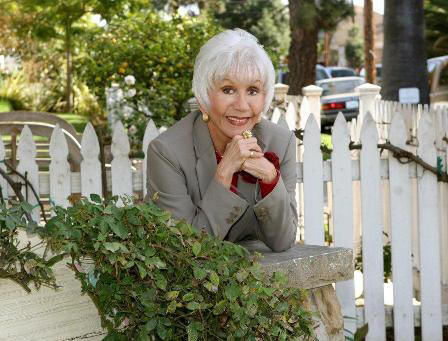 She never,
however, lost sight of the entertainment value of entertainment. Her
celebrity interviews, both in print and on video, are now considered
something of a national treasure, a time capsule and a study in
smarts. She blazed the trail not only for entertainment reporters
and media, but for women as well. In 1975, her show biz updates and
interviews went national – and supernova
–
as she
began her stint as a correspondent for
the brand new morning TV concept, Good Morning America.
She never,
however, lost sight of the entertainment value of entertainment. Her
celebrity interviews, both in print and on video, are now considered
something of a national treasure, a time capsule and a study in
smarts. She blazed the trail not only for entertainment reporters
and media, but for women as well. In 1975, her show biz updates and
interviews went national – and supernova
–
as she
began her stint as a correspondent for
the brand new morning TV concept, Good Morning America.
Although she is
retired from the business today and dedicating herself to important
causes, she still is as dynamic as ever, and ready to talk
(fortunately to me!). I caught up to her by telephone at her ranch
in the Santa Ynez Valley of California.
Wait a minute. A
Jewish girl from Brooklyn owning a ranch? Excuse me, but what’s that
about?
“It’s been a very
long trip, but like all of my dreams,
[it]
became a reality,” she
says. “I’ve always dreamed one day that I would live in the
mountains and that I would do something. What, I didn’t know. But
have a dream. Make sure the dream stays with you and you can turn it
into a reality.”
The “what” turned
out to be a thirty-plus-year career interviewing the power players,
among other things. She learned very early on that she was a member
of a very influential generation, and its most prominent members
were about to turn the world on its ear.
“I was one of the
few people who first had an opportunity to be on television,” she
says, “which was sort of in its infancy stage. That was really a
whole new lesson about journalism and about covering a business that
was really very vast. Most people thought of it as something rather
superficial. They had no idea that it really was a big business and
had a tremendous influence worldwide.”
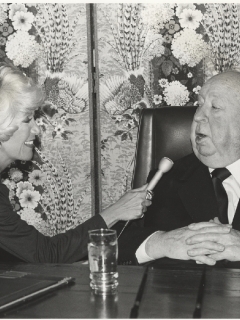 Of course, she
first had to persuade the powers-that-be that it would be okay for
her to tell America about the powers-that-be.
Of course, she
first had to persuade the powers-that-be that it would be okay for
her to tell America about the powers-that-be.
“In the
beginning, I had to convince the bosses of the networks and the
newspapers that there was a need for this material,” she says. “I
realized that [television] was a medium that was going to be so
powerful and that most people would be gaining their knowledge and
their information from television news.
“I thought that
the entertainment industry was important because it was usually the
second or third thing that everybody turned to in their newspaper.
Therefore, I thought that it was deserving of being on television. I
fought very hard for a lot of years and finally succeeded.
“Over the years,
I changed the kind of material that I broadcast, and I began
teaching the public about our industry – how it really works and who
are the people who really ran it and decided what you and I got to
see and hear, in music and television and films. It was a very
all-encompassing kind of career for me. I began to realize the
greater importance that this industry really had.”
Her technique
wasn’t just about yentering it up with the flavors of the month. She
had a philosophy behind her interviewing style, and it opened the
gates for the bigwigs to file though, one at a time, no pushing.
She says, “I had
a saying that when you were in the gutter, there were thousands of
people who wanted to help you to the sidewalk. And for reasons that
I think are very human, there is a lot of jealousy and there are
millions who want to shove you back into the gutter.
“What I found is
that on a one-to-one basis, my interest was always: what makes
people tick? I wanted to know for my own self. How do these people
get to where they got to and what was their motivation? Who were
they really? Was there any similarity to the ‘reel’ roles they were
playing and the ‘real’ life that they were living? That was my only
agenda.
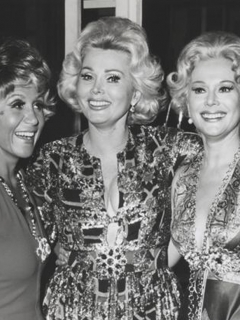 “On a one-to-one
basis, I found everybody to have, more or less, an interesting
story, once you began to peel the onion. You had to go layer by
layer until people trusted you and then you could find out all those
little things that you really wanted to know. Then you could compare
them to your own life.
“On a one-to-one
basis, I found everybody to have, more or less, an interesting
story, once you began to peel the onion. You had to go layer by
layer until people trusted you and then you could find out all those
little things that you really wanted to know. Then you could compare
them to your own life.
“I think that’s
what a lot of people out there, watching a movie, watching a
television show, listening to music, often say to themselves. Can I
be like them? Am I like them? What do they have that I don’t have?
Or they discover that these people have a lot of things to say and
they may be so similar to your own life. And therefore you don’t
feel alone.”
This tactic was
formulated in her own childhood, where loneliness was an unfortunate
factor in her early experience.
She says, “I was
born with a handicap that prevented me from doing most of the things
that that every young child can do. In some instances, it was a
fairly lonely life for me, looking through windows and watching
other children play and not be able to participate. I struggled to
prove that I could make something of myself despite the difficult
frailties that I had to live with. I had to more or less figure out
a way to overcome or jump over the obstacles that were in my path
and make something out of my life.”
The bittersweet
isolation of her own early years helped her to understand the
isolation of even some of the world’s biggest and most beloved
stars. As well, she showed great respect for those who could, as
they said in the seventies, “tell it like it is.”
She says, “The
honesty of a Cher at the beginning phase of her career was most
amazing because there wasn’t anything that you couldn’t talk to her
about. She was so open and willing to tell you and open up her
feelings about everything. I found that to be true of many women.
You had to gain their confidence.
 “It was
from women that I really learned how willing they were to share
about both the good times and the bad times that they were having in
their life. Men were always far more reluctant. They were the bigger
challenge. Eventually, I had many men tell me stories about
themselves that really gave you a real insight into who they were. I
think all of that helped me get the stories that I wanted to get.”
“It was
from women that I really learned how willing they were to share
about both the good times and the bad times that they were having in
their life. Men were always far more reluctant. They were the bigger
challenge. Eventually, I had many men tell me stories about
themselves that really gave you a real insight into who they were. I
think all of that helped me get the stories that I wanted to get.”
Among the many
things she’s learned is that the bigger they are, the more secure
and open and comfortable they seem. This may be a generational
thing, as she states, “The more secure an actor became, and knew of
who he or she was, the more willing they were to talk. But then,
there was this new generation of which I too belonged, which was the
beginning of the teenage revolution. I was in the same age bracket
of all of those young Hollywood stars. We were already starting to
talk about the subject matter which men and women would never talk
about before.
“With the birth
of the pill, the whole sexual orientation of this country began to
change. People started experimenting and doing things and some
people were very willing to talk about it.
“Then came the
big drug culture. It was there where you just couldn’t really tell
for sure what was going on. I must admit that there were dozens of
actors and actresses who, when I was having a conversation with
them, I knew that they were on some kind of substance. So you never
knew for sure if that was the real them.
“One of the
questions I would always ask was, ‘Are you happy?’ or ‘Are you
content with the role that you are now having in life?’ And every
once in a while, somebody would say, “Hey, listen, I’ve been through
the whole drug scene. I spent $750,000 in one year just on cocaine.’
“I heard stories
like that too many times. And there was a whole legion of movies
that were made during that period when the majority of people
involved in the making of these films were all on drugs. I think
that they were some of the worst films that ever came out during
that period. Not all, but a lot.”
Those people may
have been high, but one thing that is not high is her opinion of the
entertainment business today. It’s morphed and evolved and
duplicated itself into media infinity, often forsaking quality and
reason.
“For the most
part [it’s] been trivialized,” she says. “It’s just different, and
controlled by the [public relations] people today. It’s really
controlled by the spin-meisters. Those are the PR people who are in
control of the artists and the films and the music.
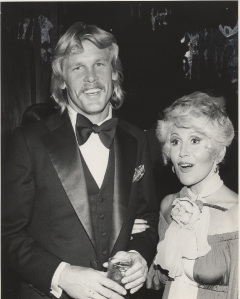 “You can become a
celebrity, as Andy Warhol once said, for fifteen minutes, by doing
something outrageous. I’m still trying to figure out what the Paris
Hiltons of this world have done. So I’m not the person to ask
because I have yet to figure it out.”
“You can become a
celebrity, as Andy Warhol once said, for fifteen minutes, by doing
something outrageous. I’m still trying to figure out what the Paris
Hiltons of this world have done. So I’m not the person to ask
because I have yet to figure it out.”
Yet she has not
left herself behind in the dark ages. In fact, you can follow her in
all the new traditional ways. However, time permits only so much.
“I don’t Twitter
as much as I would like to,” she admits. “I enjoy it, but it takes
up a heck of a lot of time. I don’t find as much time as I would
like to blog and Twitter. I love the internet, but I’m not quite
sure that everything I read is true.”
That’s because
her current focus is on The Rona Barrett Foundation. This
organization provides recognition and financial support to nonprofit
organizations which address the trials and tribulations facing
low-income seniors today. These concerns include Assisted Living,
Adult Day Care centers and other basic means desperately needed by
senior citizens. The Foundation identifies other nonprofit
organizations and programs that can best use financial support and
recognition to address these needs.
She says, “This
all began after my father had come to live with me after my mother
had passed away. I had about half a dozen older friends who had all
been so beneficial to me during my years in Hollywood. They were
running into trouble, having no one to take care of them.
“I realized that
there were no – or not many – advocates for seniors, who were the
first to get cut from all kinds of public programs. I said, I think
enough of this. This has to stop. I started The Rona Barrett
Foundation for seniors in need.
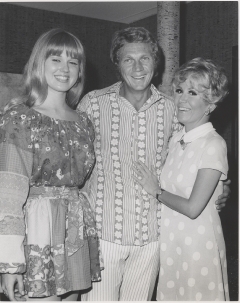 “We [want to]
build a pilot facility that will possibly be duplicated all over the
country in smaller communities. This can allow seniors who are in
need, mainly those who are on SSI [Social Security Insurance], to
[enjoy] their last wonderful years – known as the golden years.”
“We [want to]
build a pilot facility that will possibly be duplicated all over the
country in smaller communities. This can allow seniors who are in
need, mainly those who are on SSI [Social Security Insurance], to
[enjoy] their last wonderful years – known as the golden years.”
As Miss Rona
continues her good work, we wonder if there are any regrets, but
there is just one.
“I’ve often said
that I wished I had an opportunity to interview Jacqueline Onassis,”
she says, “but I never did. She wrote me a note once that said, ‘if
I give you an interview, I would have to give it to everybody
else.’”
Jackie’s loss, of
course. Still, she offers advice to those about to enter the
hardscrabble world of entertainment journalism.
“Know everything
there is to know about your industry,” she says. “Find out about all
the people who run the industry. And start writing accurate stories
about them. When you break a big story, that will be the beginning.
If there are still newspapers around, there is no greater education.
Start at your local newspaper, the down and dirty way. By dirty, I
mean the real way of becoming a reporter, knowing what a story is
about and what you should be looking for. Then say to yourself, ‘Is
this a story really worth reporting?’
“The need for
news right now is so overwhelming. That’s because of all the outlets
we have, we sometimes don’t take enough time to really look at the
journalism, and what the facts really are. We often run with rumors.
You should always get at least two people to confirm what a story is
before you use it.”
Miss Rona had
succeeded in helping transform the entertainment industry from
gossip to fact. And that’s a fact.
For more information on The Rona Barrett Foundation, go to
www.ronabarrett.com
Email
us Let us know what you
think.